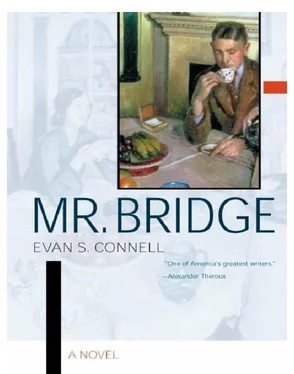Mr. Bridge nodded, wondering if the sweetish odor came from Rheingold or from something in the street.
“Good-by. Good-by.” He almost bowed.
Mr. Bridge continued to the Muehlebach. There was nothing about Rheingold which could be considered attractive, and after descending the steps to the Terrace Grill he stopped at the men’s room to wash his hands before going in to lunch.
Alex Sauer was at the table with Simon Lutweiler, Russell Arlen, and a friend of Arlen’s. Sauer evidently had arrived early and was in a hurry, because he had begun eating.
“Alex,” he said, “I was stopped on the street by someone who is a great admirer of yours. A person named Rheingold.”
At this moment the great psychiatrist was gnawing a turkey leg. He paused, wiped the grease from his chin, and exclaimed “Ah ha!” But that was all he said, so Mr. Bridge refrained from giving an opinion of the man.
On the recommendation of his own broker, who was a different kind of man, and having himself spent a considerable amount of time reading recent statistics concerned with potential, yield, dependability, sales, and earnings, Mr. Bridge one Monday morning added to his portfolio with the purchase of twenty shares of Eastman Kodak. The company had been in business for quite a while, it had paid dividends every year since 1902, and he had concluded that in spite of the almost frivolous nature of its merchandise Eastman Kodak was here to stay.
Eastman Kodak was on his mind most of the day, and after leaving the office he stopped at the newsstand to buy a copy of the evening paper. He turned to the daily listings and was shocked to find that E Kodak had dropped five points. Fluctuations were to be expected, but such a fall as this was abnormal. His first thought was that he had been swindled; yet Eastman was a reputable firm and the broker was a conscientious, honorable man with whom he had done business for fifteen years, so there was little likelihood of manipulation. All the same, in print was the disagreeable fact: down five. Eastman had neither risen nor fallen five dollars in a single day for a long time. It was as though the company had merely been waiting for him to buy before the price dropped.
Frowning, with the Star folded and stuffed into a pocket of his raincoat, he pulled on his gloves, settled his hat on his head, picked up his briefcase, and started walking toward the garage. He had worked late. Julia had gone home two hours ago. Now the streets were dark. A damp wind was blowing. It was a depressing night to be out and he looked forward to his comfortable home.
At the corner a voice behind him said: “Stick ’em up!”
Mr. Bridge continued walking. He did not believe what he had heard. Either he had not heard what he thought he heard, or if somebody had ordered him to put up his hands it must be a joke.
The command was repeated, and there were footsteps.
Mr. Bridge stopped walking and turned around. Coming toward him was a red-eyed, unshaven man with one hand thrust into the slit pocket of a shabby trench coat.
Mr. Bridge said impatiently: “What is it you want?”
“Give me your money,” the man said in hoarse voice, and he made a threatening gesture.
“Don’t be ridiculous,” said Mr. Bridge, and walked away.
While driving home he contemplated the incident. Evidently it had been a serious attempt to hold him up. The man might very well have had a gun concealed in his pocket, and it was possible that he was desperate enough to have used it. However, he could not become alarmed as he thought about it any more than he had been alarmed at the time. He felt nothing except a sort of exasperation. The man’s presumption was extraordinary. If he had no money he should get a job like everybody else.
25 Kansas City Power & Light
The years were falling over like ducks in a shooting gallery, and it seemed to Mr. Bridge that he had scarcely taken aim at one when it disappeared. Now another year was all but gone. However, it had been a good year. He was not dissatisfied. He had worked hard, harder than most men, but the work had been rewarding. He was acquiring more than he needed, quite a lot more. And yet most important was the happiness he sensed around him. He believed that his wife was happy and the children also, and because of this he felt their happiness within himself.
Christmas Eve he lay awake until he was sure everybody in the house had gone to sleep; then he got out of bed, put on his robe and slippers, and went into the study. He shut the door, turned on the desk lamp, and unzipped his briefcase. In a large manila envelope were the Christmas gifts. He folded them and slipped them into business envelopes which he addressed — one to his wife, one to each of the children, and one to Harriet. On the back of each he wrote “ from Santa .” Then he switched off the lamp and went downstairs to the living room. Moonlight from the east windows flooded the bushy green spruce and the heap of brightly colored packages. He surveyed this tranquil scene and it pleased him. He approached the Christmas tree, took five paper clips from the pocket of his bathrobe, clipped the envelopes to the branches of the tree, and returned to bed.
Next morning after breakfast the family gathered in the living room to open presents. For a while the business envelopes hung unnoticed among the peppermint candy canes, the tinsel, and the sparkling ornaments. But then Carolyn discovered them, saw that one had her name, and tore it open. She unfolded the certificate avidly, not certain what it was but sensing that it was valuable.
“Oh, goodness! My word!” Mrs. Bridge cried when she opened her envelope. “This is Christmas!”
Douglas looked skeptically at the certificate he had gotten.
“It’s ten shares of stock in the Kansas City Power & Light Company,” Ruth told him. “Thank you, Daddy.”
“You’re welcome,” he answered, laughing. “But it appears to me as if it came from Santa Claus.”
“That’s right!” Mrs. Bridge said, pointing to the back of the envelope. “Well, thank you, Mr. Santa!”
“Thank you,” Carolyn said. She was reading everything printed on the certificate.
“Thanks,” Douglas said. He was more impressed by the baseball glove and the hockey stick.
“Don’t lose these,” Mr. Bridge said, wagging his index finger in mock anger. “They’re worth quite a bit of money. I’ll put them in my safe-deposit box for you.”
“Oh, yes, please,” Mrs. Bridge said, and handed him her certificate.
Ruth handed him the one she had received.
Douglas shrugged and gave back the one he had gotten.
“I want to keep mine,” said Carolyn.
“If you want to, you can. It’s your privilege,” he said. “But if you lose it we will have to go through a considerable amount of red tape to have another certificate issued.”
“All right, here,” she said after thinking the matter over.
“I certainly do wish to thank you,” Harriet said.
“You’re most welcome, Harriet,” he said. “Would you like me to hold yours, or can you take care of it?”
“Well, if it is not too much of a problem, I would appreciate you keeping mine in the safe deposit also.”
“I’ll be glad to,” he said, and reached for it. “Any time you want it, let me know.”
While the rest of the packages were being opened he sat holding the five certificates firmly in both hands. He did not want them to get misplaced so that they might be burned in the fireplace with the tissue paper and empty boxes when the room was cleaned up. A few minutes later he carried them upstairs and put them once more in the manila envelope, which he zipped into the briefcase.
Читать дальше












